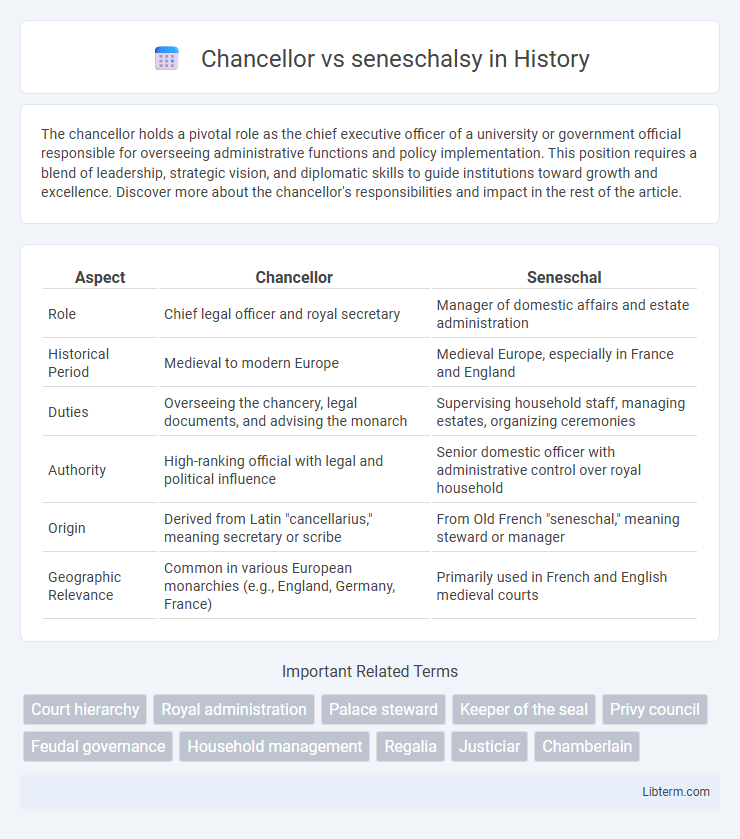The chancellor holds a pivotal role as the chief executive officer of a university or government official responsible for overseeing administrative functions and policy implementation. This position requires a blend of leadership, strategic vision, and diplomatic skills to guide institutions toward growth and excellence. Discover more about the chancellor's responsibilities and impact in the rest of the article.
Table of Comparison
| Aspect | Chancellor | Seneschal |
|---|---|---|
| Role | Chief legal officer and royal secretary | Manager of domestic affairs and estate administration |
| Historical Period | Medieval to modern Europe | Medieval Europe, especially in France and England |
| Duties | Overseeing the chancery, legal documents, and advising the monarch | Supervising household staff, managing estates, organizing ceremonies |
| Authority | High-ranking official with legal and political influence | Senior domestic officer with administrative control over royal household |
| Origin | Derived from Latin "cancellarius," meaning secretary or scribe | From Old French "seneschal," meaning steward or manager |
| Geographic Relevance | Common in various European monarchies (e.g., England, Germany, France) | Primarily used in French and English medieval courts |
Understanding the Roles: Chancellor vs Seneschal
The Chancellor primarily serves as the chief legal officer and oversees the administration of justice within a governmental or organizational structure, often managing official documents and seals. The Seneschal traditionally acts as a steward or manager of domestic affairs, responsible for overseeing the household, estates, or regional administration in medieval or feudal contexts. Differentiating these roles highlights the Chancellor's focus on legal and administrative governance, whereas the Seneschal emphasizes estate management and daily operational supervision.
Historical Origins and Evolution
The Chancellor originated in medieval Europe as a high-ranking official responsible for the administration of royal charters, legal documents, and the king's seal, evolving into a key figure in governmental and academic institutions. The seneschal dates back to the Frankish kingdoms and later medieval France, serving as a steward or manager of noble households and estates, overseeing domestic affairs and justice in the lord's absence. Both roles transformed over centuries, with the Chancellor becoming associated with statecraft and education, while the seneschal's duties merged into judicial and administrative offices within feudal systems.
Core Responsibilities and Functions
Chancellors typically oversee administrative functions and strategic leadership within universities or government, ensuring policy implementation and institutional governance. Seneschals historically managed domestic affairs, including supervising household staff, estate management, and judicial roles in medieval noble households. While chancellors emphasize broad organizational oversight and external representation, seneschals focus on operational management and internal order maintenance.
Hierarchical Position in Governance
The Chancellor typically holds a higher hierarchical position in governance than the Seneschal, often serving as the chief administrative officer or head of government in many historical and contemporary contexts. A Seneschal traditionally acts as a steward or manager of a noble household or estate, with authority limited to specific domestic or regional functions. In medieval governance structures, the Chancellor's role encompassed broader judicial and administrative powers, placing them above the Seneschal in the political hierarchy.
Regional Variations and Cultural Differences
Chancellors often hold formal political authority in centralized governments, particularly in Europe, while seneschals traditionally administer feudal estates or regional jurisdictions, especially in medieval France and England. Regional variations highlight that chancellors function as senior state officials managing legal and administrative affairs, whereas seneschals serve more localized roles tied to noble households or territorial governance. Cultural differences influence their responsibilities, with chancellors embodying bureaucratic governance in modern states and seneschals reflecting feudal hierarchies and agrarian management systems.
Key Skills and Qualities Required
Chancellors require exceptional leadership, strategic decision-making, and financial management skills to oversee academic institutions effectively. Seneschals must excel in administrative coordination, conflict resolution, and resource management to manage estates or households efficiently. Both roles demand strong communication abilities and a deep understanding of organizational structures.
Modern Equivalents and Relevance
The role of a Chancellor in modern governments often parallels that of a CEO or Prime Minister, overseeing administrative functions and policy implementation at the highest level. Seneschals, historically managing estates and domestic affairs, find contemporary equivalents in positions like estate managers, chief operating officers, or facility directors within corporate or large organizational structures. Both roles emphasize leadership and coordination but differ in scope, with the Chancellor focusing on state governance and the seneschal on operational management.
Famous Chancellors and Seneschals in History
Famous chancellors such as Thomas Cromwell and Otto von Bismarck played crucial roles in state administration, shaping policies and centralizing power across England and Germany, respectively. Renowned seneschals like Bertrand du Guesclin and William Marshal managed royal estates and military commands, often acting as key advisors in medieval France and England. Both offices were pivotal in governance, with chancellors focusing on legal and administrative reforms while seneschals oversaw domestic affairs and localized authority.
Interactions with Other Governmental Offices
The Chancellor typically engages directly with executive branches and oversees the administration of government policies, coordinating closely with ministries and the head of state. In contrast, a Seneschal historically managed domestic affairs within noble households or regional jurisdictions, interacting primarily with local courts and feudal authorities rather than centralized government offices. The Chancellor's role involves strategic communication across multiple governmental departments, whereas the Seneschal's interactions are more localized and focused on managing manorial or administrative tasks within a specific territory.
Choosing Between a Chancellor and a Seneschal
Choosing between a Chancellor and a Seneschal hinges on the specific administrative duties required, as a Chancellor traditionally manages legal affairs, record-keeping, and official documentation, while a Seneschal oversees domestic or household management and sometimes broader regional governance. Organizations prioritizing judicial authority and formal documentation benefit from appointing a Chancellor to ensure precise legal oversight and protocol adherence. Conversely, institutions seeking efficient oversight of logistics, estate administration, or day-to-day operational control should consider a Seneschal for their expertise in managing resources and personnel effectively.
Chancellor Infographic

 libterm.com
libterm.com